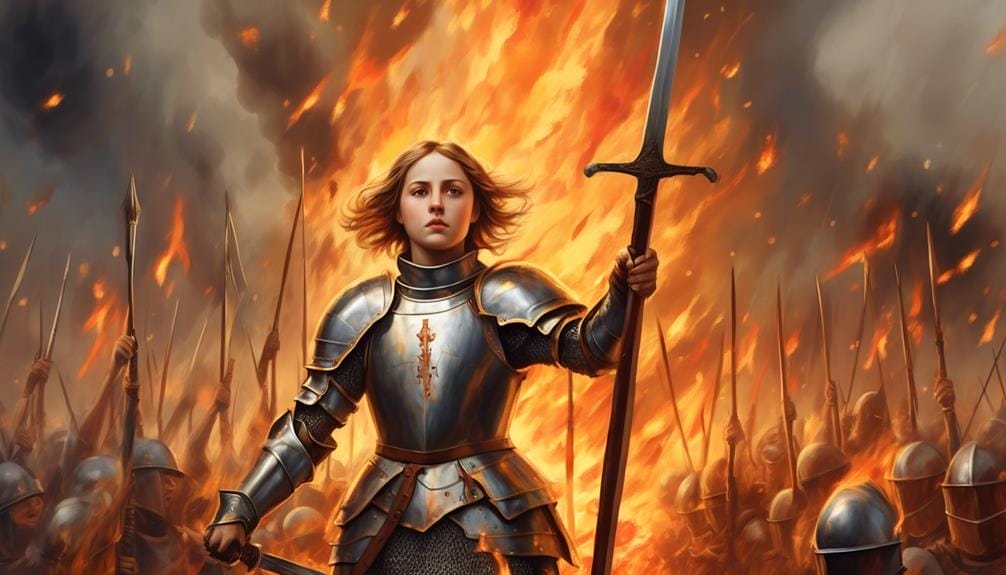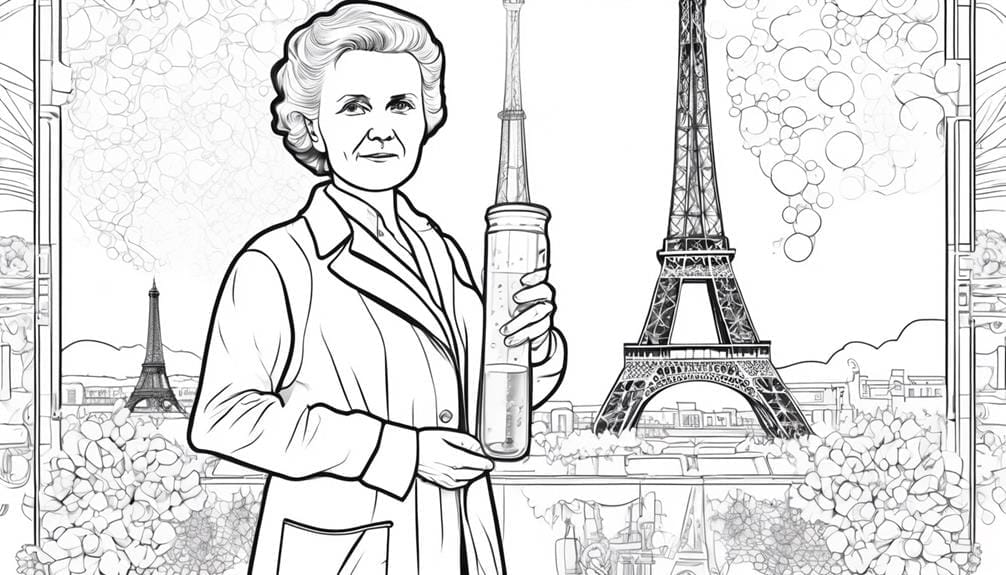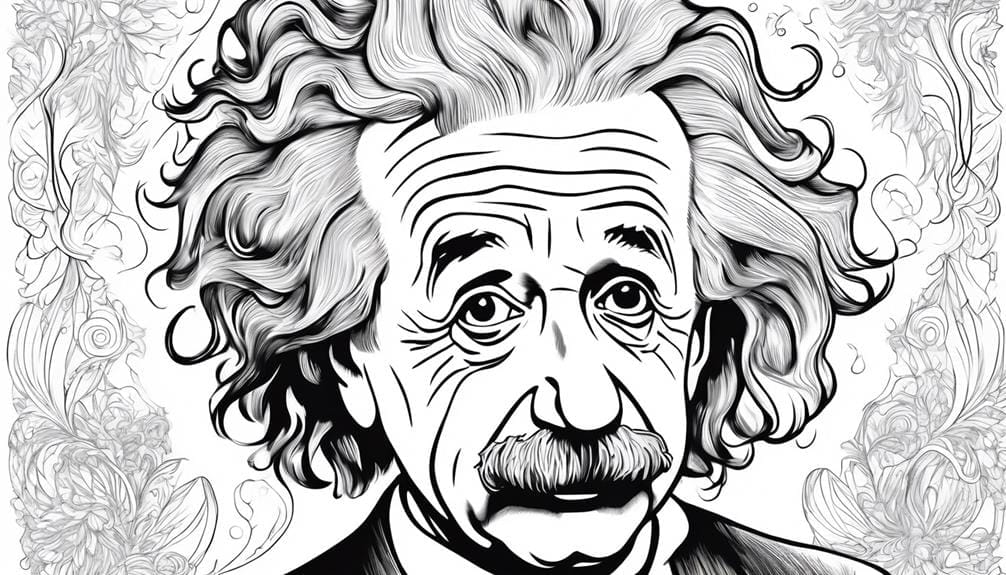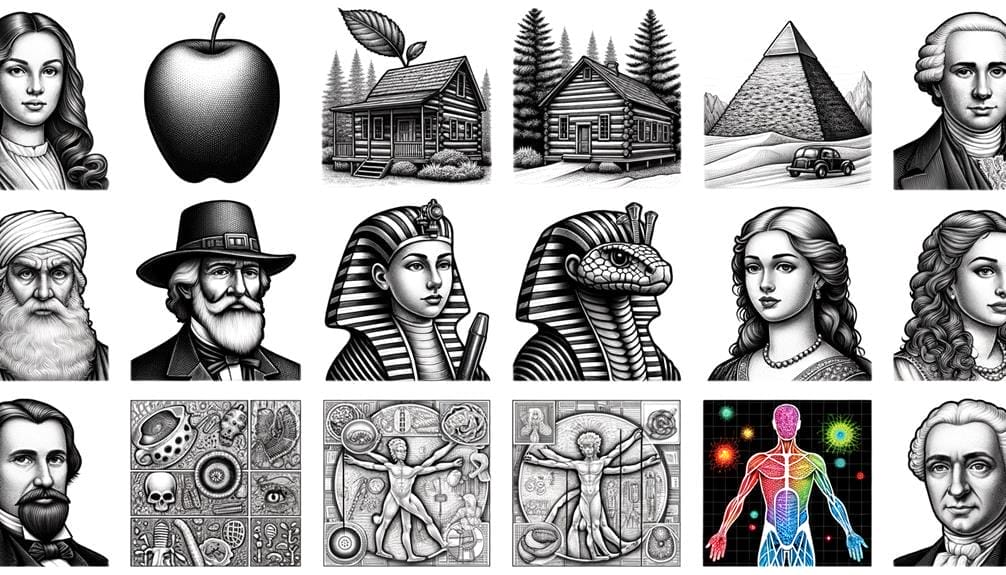Did you know that coloring has been proven to reduce stress and anxiety in both children and adults? It's true!
And what better way to combine the therapeutic benefits of coloring with the opportunity to learn about fascinating historical figures than through Historical Figures Coloring Pages?
Whether you're a parent looking for an engaging activity for your child or an adult seeking a relaxing and educational pastime, these coloring pages offer a unique way to explore the lives and contributions of influential individuals throughout history.
So, grab your colored pencils and get ready to embark on a journey through time as you bring these remarkable figures to life on the page.
Key Takeaways
- Coloring pages of historical figures offer a therapeutic and engaging activity for both children and adults.
- They provide a unique way to learn about influential individuals such as Abraham Lincoln, Cleopatra, and Leonardo Da Vinci.
- Historical figures like Abraham Lincoln played significant roles in shaping history, and coloring pages can help educate and spark interest in their stories.
- Cleopatra's intelligence, beauty, and political alliances made her a powerful figure, and coloring pages can showcase her impact on the ancient world.
Abraham Lincoln
Abraham Lincoln, the 16th President of the United States, led the nation through the American Civil War and issued the Emancipation Proclamation, abolishing slavery in the country. He's a popular subject for coloring pages in the category of Historical Figures coloring.
These coloring pages can be found online and printed for children to enjoy. However, it's important to be aware of the use of cookies when browsing coloring pages. Cookies are small pieces of data stored on your browser that collect information about your online activity.
When visiting websites that offer coloring pages, cookies may be used to track your preferences and tailor the content to your interests. Additionally, third party cookies may be used to collect information for targeted advertising purposes.
To protect your privacy, it's recommended to regularly clear your browser's cookies and be cautious when prompted with the cookie banner on websites offering coloring pages. By being mindful of cookies and the information collected, you can enjoy coloring pages of historical figures like Abraham Lincoln while maintaining your online privacy.
Cleopatra
Cleopatra's reign as the last ruler of the Ptolemaic Kingdom of Egypt was marked by her intelligence and beauty, which captivated both Julius Caesar and Mark Antony.
Her influence extended beyond her personal relationships, as she played a key role in the political and power struggles of the ancient world.
Today, Cleopatra's legacy is remembered for her dramatic life and her impact on the conflicts of the Roman Republic.
Cleopatra's Reign
During Cleopatra's reign, she captivated the world with her intelligence, beauty, and strategic power as the last active ruler of the Ptolemaic Kingdom of Egypt. Cleopatra's reign marked a significant period of political intrigue and cultural advancements in ancient Egypt.
Known for her relationships with Julius Caesar and Mark Antony, Cleopatra utilized her alliances to maintain her grip on power and protect her kingdom. She was a masterful strategist, employing diplomacy and cunning to navigate the complex political landscape of the time.
Cleopatra's reign also witnessed the expansion of Egypt's influence and wealth, as she fostered trade and cultural exchanges with other civilizations.
Her legacy as a powerful and influential leader continues to fascinate and inspire people to this day.
Cleopatra's Influence
Her influence, intelligence, and strategic alliances shaped the political landscape of her time, making Cleopatra a captivating and influential figure in history.
As the last active ruler of the Ptolemaic Kingdom of Egypt, Cleopatra's relationships with Julius Caesar and Mark Antony had a significant impact on the politics and power dynamics of the era.
Through her alliances with prominent Roman leaders, Cleopatra was able to maintain her position of authority and protect the interests of Egypt.
Her intelligence and beauty further enhanced her influence, allowing her to navigate the complex web of international politics.
Today, Cleopatra's story continues to inspire and captivate people, serving as a symbol of power, intelligence, and resilience.
Cleopatra's Legacy
Known as the last active ruler of the Ptolemaic Kingdom of Egypt, Cleopatra's legacy continues to captivate and inspire people worldwide. Her story has been immortalized in literature, art, and film, making her a prominent figure in popular culture.
Cleopatra's reign and relationships with Julius Caesar and Mark Antony have been subjects of historical and scholarly fascination, further contributing to her enduring legacy. Her intelligence and beauty, coupled with her political influence in ancient Egypt and Roman politics, have solidified her place in history.
Cleopatra's enduring legacy has transcended time and continues to captivate audiences today. From coloring pages to academic studies, Cleopatra's impact on society remains significant. She serves as a reminder of a powerful and influential woman who left an indelible mark on history.
Leonardo Da Vinci
Did you know that Leonardo Da Vinci wasn't only a brilliant artist, but also a pioneering scientist?
His masterpieces like the Mona Lisa and The Last Supper are renowned worldwide, but Da Vinci's scientific discoveries are equally impressive.
He made groundbreaking advancements in various fields, including anatomy, engineering, and physics.
From his detailed anatomical drawings to his innovative designs for flying machines, Da Vinci's contributions to both art and science continue to inspire and fascinate us today.
Da Vinci's Masterpieces
Leonardo da Vinci, the renowned artist and inventor, created masterpieces that continue to inspire and captivate audiences worldwide. His work exemplifies the fusion of art, science, and creativity, showcasing his unparalleled talent and innovation.
Da Vinci was known for masterpieces such as the Mona Lisa and The Last Supper paintings, which have become iconic symbols of his genius. His famous quote, 'Simplicity is the ultimate sophistication,' reflects his approach to art and life.
Da Vinci's contributions have left an indelible mark on the world of art and continue to be celebrated across generations. His masterpieces not only showcase his artistic brilliance but also serve as a testament to the power of human imagination and the potential for limitless creativity.
Leonardo's Scientific Discoveries
With his keen observations and innovative thinking, Leonardo da Vinci left an enduring legacy through his scientific discoveries. He made significant contributions to various scientific fields, including anatomy, engineering, and astronomy. Leonardo's studies of anatomy involved detailed drawings and observations of the human body, providing valuable insights into physiology. Additionally, he conceptualized and designed inventions such as flying machines and war machines, showcasing his forward-thinking approach. His scientific curiosity and meticulous observations laid the foundation for numerous advancements in science and technology. To convey a deeper meaning, consider the following table:
| Scientific Field | Contributions |
|---|---|
| Anatomy | Detailed drawings and observations of the human body |
| Engineering | Conceptualized and designed various inventions, including flying machines and war machines |
| Astronomy | Made significant discoveries and observations about celestial bodies |
These discoveries demonstrate Leonardo's immense impact on the scientific world, influencing future generations of scientists and inventors.
Joan of Arc

Joan of Arc, the fearless French military leader and saint, achieved numerous victories during the Hundred Years' War. Her remarkable leadership and bravery made her a symbol of French patriotism and resistance. She led the French army to several triumphs against the English, inspiring her troops with her unwavering determination.
Joan claimed to have received divine visions and guidance, which guided her actions and helped her overcome seemingly insurmountable odds. Her legacy continues to inspire people around the world as a testament to the power of faith and courage. Despite her young age of 19, Joan of Arc's devotion to her country and her unwavering spirit led her to become a significant figure in history.
The Catholic Church later canonized her as a saint, recognizing her extraordinary contributions. Joan of Arc's story serves as a reminder of the indomitable human spirit and the ability to achieve greatness even in the face of adversity.
Mahatma Gandhi
Mahatma Gandhi, the leader of the Indian independence movement, is known for his principles of nonviolent resistance. Through his advocacy for civil disobedience, he played a crucial role in India's fight against British rule.
Gandhi's influence extended beyond India, inspiring movements for social justice and equality globally. His legacy continues to be a beacon of hope and inspiration for those seeking peace and change.
Gandhi's Nonviolent Resistance
Gandhi, the influential leader of the Indian independence movement, championed nonviolent civil disobedience as a powerful tool for protest and resistance against British rule. His philosophy of nonviolent resistance inspired civil rights movements around the world.
Gandhi led campaigns for social and economic justice through nonviolent methods, emphasizing the power of peaceful protest and passive resistance. His approach involved boycotting British goods, organizing mass protests, and fasting as a form of self-sacrifice. By refusing to engage in violence, Gandhi demonstrated the strength of moral conviction and the ability to effect change without resorting to aggression.
His nonviolent resistance ultimately played a significant role in India's struggle for independence. Gandhi's legacy continues to inspire individuals and movements seeking peaceful solutions to social and political challenges.
Influence on Indian Independence
The influence of Mahatma Gandhi on Indian independence is evident in his advocacy for nonviolent civil disobedience. Gandhi's belief in peaceful resistance and his ability to mobilize the masses played a crucial role in the fight against British rule in India. He led campaigns for social and economic justice, uniting people from all walks of life in their pursuit of freedom. Gandhi's nonviolent approach inspired civil rights movements around the world, leaving a lasting impact on the fight for justice and equality. His philosophy of ahimsa (nonviolence) continues to resonate today, reminding us of the power of peaceful protest and the ability to bring about positive change. Gandhi's legacy as the father of the Indian independence movement remains an inspiration to generations seeking liberation from oppression.
| Fact 1 | Fact 2 | Fact 3 |
|---|---|---|
| Gandhi was a leader of the Indian independence movement | He advocated for nonviolent civil disobedience | His influence paved the way for India's freedom from British rule |
Legacy and Global Impact
As we move forward from discussing Gandhi's influence on Indian independence, we now turn to explore his lasting legacy and global impact.
Mahatma Gandhi's leadership in the Indian independence movement against British rule has left an indelible mark on history. His advocacy for nonviolent civil disobedience continues to inspire social and political movements worldwide.
Gandhi's campaigns for social and economic justice have had a profound impact on human rights and equality globally. His approach of peaceful resistance has influenced various global movements, including civil rights and anti-apartheid struggles.
The principles and philosophy of Mahatma Gandhi have played a significant role in shaping modern-day activism and peaceful resistance around the world. His legacy serves as a reminder of the power of peaceful protest and the ability to bring about lasting change.
George Washington
George Washington, the first President of the United States, led the Continental Army to victory during the American Revolutionary War. Washington's contributions to the nation's founding and his leadership during the war have made him a prominent figure in American history. His legacy extends beyond his presidency, as he is often referred to as the 'Father of His Country.' Washington's face is even depicted on the one-dollar bill and the quarter. To provide a deeper understanding of George Washington's impact, here is a table highlighting key aspects of his life and accomplishments:
| Key Aspects | Details |
|---|---|
| Early Life | Born on February 22, 1732, in Westmoreland County, Virginia |
| Military Leadership | Led the Continental Army against the British during the Revolutionary War |
| Presidency | Served as the first President of the United States from 1789 to 1797 |
| Presidential Precedents | Established important precedents such as the two-term limit and the title "Mr. President" |
| Farewell Address | Delivered a famous speech upon leaving office, warning against political factions and foreign entanglements |
Marie Curie

Marie Curie, a pioneering physicist and chemist, revolutionized the field of radioactivity with her groundbreaking research. Here are some key facts about Marie Curie:
- Marie Curie was a Polish-born physicist and chemist who pioneered research on radioactivity. Her discoveries and contributions laid the foundation for advancements in the field of nuclear physics and medicine.
- She was the first woman to win a Nobel Prize and the only person to win Nobel Prizes in two different scientific fields: physics and chemistry.
- Despite facing gender discrimination, Marie Curie became a role model for women in science and academia. Her determination and perseverance continue to inspire future generations of scientists and researchers.
- Marie Curie's legacy extends beyond her scientific achievements. Her work not only improved our understanding of the atomic world but also had practical applications in healthcare, leading to advancements in the diagnosis and treatment of diseases.
Marie Curie's contributions to science and her remarkable achievements make her a true icon in the scientific community. Her story serves as a reminder that gender should never be a barrier to pursuing one's passion and making significant contributions to the world.
Amelia Earhart
Amelia Earhart, an American aviator, made history as the first woman to fly solo across the Atlantic Ocean. Her fearless spirit and determination inspired many, and she set numerous aviation records during her career. Earhart's passion for promoting the arts and literature, including the works of William Shakespeare, showcased her diverse interests and love for intellectual pursuits.
Unfortunately, Earhart's life was cut short when she disappeared in 1937 while attempting to circumnavigate the globe. To this day, her fate remains a mystery, leaving behind a legacy that continues to inspire and influence aviation and women's rights.
| Amelia Earhart | ||
|---|---|---|
| First woman to fly solo across the Atlantic Ocean | Disappeared while attempting to circumnavigate the globe | Passionate promoter of arts and literature |
Amelia Earhart's achievements and courage serve as a reminder that breaking barriers and pursuing one's dreams is possible, regardless of gender. Her story encourages individuals to embrace challenges and strive for greatness. Although she may no longer be with us, her legacy lives on, inspiring future generations to reach for the skies and make their mark on history.
William Shakespeare
With his 37 plays and 154 sonnets, William Shakespeare remains a timeless figure in literature, captivating audiences worldwide with his profound influence and unparalleled talent. His works have left an indelible mark on the literary world, making him widely regarded as the greatest writer in the English language.
Shakespeare's plays, such as 'Hamlet,' 'Macbeth,' 'Romeo and Juliet,' and 'A Midsummer Night's Dream,' have been performed and adapted countless times, showcasing the enduring power of his storytelling. From tragic tales of love and betrayal to comedic escapades filled with mistaken identities, his plays continue to resonate with audiences of all ages.
Shakespeare's legacy continues to inspire and captivate, reminding us of the timeless themes and complexities of the human experience. His plays and sonnets showcase the depth and range of human emotions and explore timeless themes such as love, jealousy, and ambition. They have been performed and adapted in various languages and cultures, further demonstrating Shakespeare's global impact.
Moreover, Shakespeare's influence can be seen in the countless references and adaptations in popular culture. His works have been reimagined in films, television shows, and even music, proving that his storytelling remains relevant and compelling to this day.
Rosa Parks
Rosa Parks, a prominent civil rights activist, made history with her courageous act of defiance that ignited the Montgomery Bus Boycott. Her refusal to give up her bus seat to a white passenger sparked a significant movement against racial segregation. Rosa Parks' stand symbolized the struggle for equality and civil rights, making her an iconic figure in American history. She played a crucial role in advocating for nonviolent resistance and racial equality, leaving a lasting impact on the civil rights movement.
Rosa Parks' legacy and contributions were honored with numerous awards and recognitions, including the Presidential Medal of Freedom. Her brave actions continue to inspire people around the world to fight against injustice and discrimination. By refusing to accept the unjust laws of segregation, Rosa Parks became a catalyst for change.
Today, Rosa Parks is remembered as a courageous trailblazer who stood up for what she believed in, even in the face of adversity. Her story serves as a reminder that one person can make a difference and that ordinary individuals have the power to spark extraordinary change. Rosa Parks' legacy will forever be intertwined with the struggle for equal rights and justice, making her an important figure in the history of the civil rights movement.
Albert Einstein

Albert Einstein, a renowned German-born theoretical physicist, revolutionized the field of physics with his groundbreaking theories and discoveries. Here are some key facts about Albert Einstein:
- Albert Einstein developed the theory of relativity, which transformed our understanding of space, time, and gravity.
- In 1921, he was awarded the Nobel Prize in Physics for his work on theoretical physics.
- Einstein's famous equation, E=mc^2, demonstrated the equivalence of mass and energy and became a cornerstone of modern physics.
- His work had a profound impact on various areas, including nuclear energy, quantum mechanics, and our understanding of the universe's fundamental nature.
Einstein's contributions to science continue to shape our world today. His theories and discoveries paved the way for numerous advancements in technology and our understanding of the universe. Through his revolutionary work, Einstein left an indelible mark on the scientific community and inspired future generations of physicists.
Helen Keller
Helen Keller, a deaf-blind author, political activist, and lecturer, made significant contributions to the advancement of women's suffrage and labor rights. Despite her disabilities, Keller became the first deaf-blind person to earn a Bachelor of Arts degree. She co-founded the American Civil Liberties Union (ACLU) and fought tirelessly for the rights of women and workers.
Keller's education and communication abilities were greatly influenced by her teacher, Anne Sullivan. Through Sullivan's guidance, Keller learned to communicate using tactile sign language and braille, enabling her to write her autobiography, 'The Story of My Life.' This inspiring book has been translated into 50 languages, spreading Keller's message of resilience and determination to people around the world.
When browsing the internet and visiting websites, it's important to be aware of the role of third-party providers and the use of cookies. Cookies are small files stored on your internet device that allow websites to function properly and personalize your browsing experience. They also provide valuable analytics for website owners and help support advertising efforts.
While cookies can enhance your online experience, it's essential to understand how they're used and to manage your cookie settings appropriately. By being informed and proactive, you can ensure a safer and more tailored internet experience.
Frequently Asked Questions
What Were the Hobbies and Interests of Abraham Lincoln?
Abraham Lincoln had a variety of interests and hobbies. He enjoyed reading, storytelling, and playing chess. He also loved horseback riding, swimming, and attending the theater. These were some of his favorite pastimes and leisure pursuits.
How Many Children Did Cleopatra Have?
Cleopatra, the legendary Egyptian queen, had four children. Her offspring included three sons, Caesarion, Alexander Helios, and Ptolemy Philadelphus, as well as a daughter named Cleopatra Selene II. Her maternal role played a significant part in her family tree and legacy.
What Were Leonardo Da Vinci's Contributions to Art and Science?
Leonardo da Vinci made significant contributions to art and science. His artistic techniques, exploration of perspective, and anatomical studies revolutionized Renaissance art. He also made scientific discoveries, invented various devices, and his engineering contributions still influence us today. His impact on future generations is immeasurable.
How Did Joan of Arc Become a Symbol of French Nationalism?
Discover how Joan of Arc's military leadership, unwavering faith, and divine guidance transformed her into a symbol of French nationalism. Explore her impact on French culture and her enduring legacy in French history.
What Were Mahatma Gandhi's Principles of Non-Violent Resistance?
Mahatma Gandhi's principles of non-violent resistance, also known as Satyagraha, emphasized civil disobedience, peaceful protest, and passive resistance. He believed in the power of love and compassion to bring about social justice.
Conclusion
In conclusion, historical figures coloring pages provide an engaging way to learn about important individuals throughout history.
Did you know that coloring has been found to reduce stress and anxiety in both children and adults?
By combining the therapeutic benefits of coloring with educational content, these coloring pages offer a unique and enjoyable way to explore the lives and achievements of influential figures from diverse fields.
Start coloring and discover the fascinating stories behind these historical icons.


